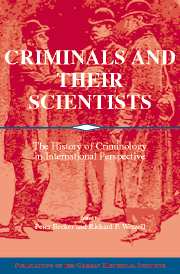Book contents
- Frontmatter
- Introduction
- Part One Nonacademic sites of Nineteenth-Century Criminological Discourse
- Part Two Criminology as Scientific and Political Practice in the Late Nineteenth and Early Twentieth Centuries
- Part Three The Making of the Criminologist
- Part Four Criminology in the First Half of the Twentieth Century: The Case of Weimar and Nazi Germany
- Index
Introduction
Published online by Cambridge University Press: 05 January 2013
- Frontmatter
- Introduction
- Part One Nonacademic sites of Nineteenth-Century Criminological Discourse
- Part Two Criminology as Scientific and Political Practice in the Late Nineteenth and Early Twentieth Centuries
- Part Three The Making of the Criminologist
- Part Four Criminology in the First Half of the Twentieth Century: The Case of Weimar and Nazi Germany
- Index
Summary
The chapters gathered in this book under the title Criminals and Their Scientists seek to contribute to a history of criminology as discourse and practice. They do not follow established models of genealogical reconstructions of criminology as a set of ideas. Although famous representatives of the canon of criminological theories, such as Cesare Lombroso, figure prominently in many of the chapters, such icons of “scientific progress” in the study of crime are discussed not as isolated thinkers, but as participants in a polyphonic discourse with close ties to penal institutions. To avoid the danger of replacing a genealogical with an exclusively social historical perspective, the chapters herein approach criminology as a discursive practice. To be sure, the institutional settings that provided the stage for different criminological actors play an important role in our stories. But professionalization and the institutionalization of criminology as a recognized scientific field and later as an academic discipline cannot fully account for the continuities and ruptures in the history of the study of crime and criminals. Nor can the discursive and institutional strategies of criminologists be explained by a conceptual framework that focuses on divergent class interests.
- Type
- Chapter
- Information
- Criminals and their ScientistsThe History of Criminology in International Perspective, pp. 1 - 22Publisher: Cambridge University PressPrint publication year: 2006



